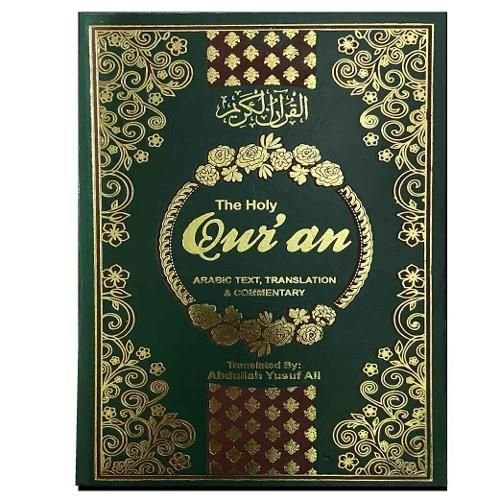

Rodwell arranged the Sūras in a rough chronological order.
#English translation of the holy quran abdullah yusuf ali series#
Considering that Maracci’s object was to discredit Islam in the eyes of Europe, it is remarkable that Sale’s translation should be looked upon as a standard translation in the English speaking world, and should pass through edition after edition, being even included in ‘the series called the Chandos Classics and receiving the benediction of Sir E. George Sale’s translation (1734) was based on Maracci’s Latin version, and even his notes and, his Preliminary Discourse are based mainly on Maracci. Ross was but a translation of the first French translation of Du Ryer of 1647, and was published a few years after Du Ryer’s. Maracci was himself a Confessor to Pope Innocent XI his work is dedicated to the holy Roman Emperor Leopold I and he introduces it by an introductory volume containing what he calls a “Refutation of the Qur-ān.” Maracci was a learned man, and there is no pretence about the object he had in view, viz., to discredit Islam by an elaborate show of quotations from Muslim authorities themselves. Meanwhile Maracci had produced in 1689 a Latin version of the Qur-ān with the Arabic Text and quotations from various Arabic Commentaries, carefully selected and garbled, so as to give the worst possible impression of Islam to Europe. I believe the Ahmadīya Association of Lahore have in hand a fresh translation into German and Dutch. The Germans have followed up Schweigger with Boysen’s translation in 1773, Wahl’s in 1828, and Ullmann’s (first edition in 1840). Savary’s French translation appeared in 1783, and Kasimirski’s French translation (which has passed through several editions) first appeared in 1840, the French interest in Islam having been stimulated by French conquests in Algeria and North Africa. A French translation by Du Ryer was published at Paris in 1647, and a Russian one at St. Schweigger’s German translation was published at Nurenburg (Bavaria) in 1616. This was translated into Italian, German, and Dutch. The place of publication was Basle and the publisher Bibliander. A Latin translation was made for the Monastery of Clugny about 1143 (in the sixth century of the Hijra’) but not published till 1543. The projected Urdu translation by Hakīm Ahmad Shujā’ has not yet been published.īefore the development of the modern European vernaculars, the cultivated language of Europe was Latin. Among the complete ones, much used at the present day, may be mentioned those of Shāh Rafi’-ud-dīn of Delhi, Shāh Ashraf ‘Ali Thānawī, and Maulvi Nazīr Ahmad (d. Since then numerous Urdu translations have followed, some of which have been left incomplete. He has already been mentioned among the Indian Commentators. The earliest Urdu translation was by Shāh ‘Abdul Qadir of Delhi (d 1826). I believe there is also a Chinese (dialectical) translation. The translations into non-European languages known to me are: Persian, Turkish, Urdu, Tamil (used by Moplas), Pashto (for Afghans), Bengali, Malay, some of the languages of the Eastern Archipelago, and some of the African languages. Hence the need for good and accurate translations.

I wish that his or her ambition were also to understand the Qur-ān, either in Arabic or in the mother tongue or some well developed tongue which he or she understands. The ambition of every Muslim is to read the sounds of the Arabic Text. The ambition of every learned Muslim is to read the Qur-ān in Arabic. That is what happened with the earlier Urdu translations. The translation has nither grammatical finish nor a form which can stand independently by itself. Where the language is undeveloped, the translation is nothing more than a rough explanation of the Arabic Text. Where the notion itself is new to the speakers of polished languages, they are glad to borrow the Arabic word expressing that notion and all the associations connected with it. Even in cultivated languages like Persian or Turkish, the introduction of religious terms from Arabic gave a body of words which were common to the whole Islamic world, and thus cemented that unity of the Muslim Brotherhood which is typified by the Qibla. If the language is undeveloped many of the Arabic words of the Qur-ān are taken over bodily into it for want of corresponding words in the language. Usually the Text is printed with the Translation. Almost all languages spoken by Muslims have translations of the Qur-ān in them.


 0 kommentar(er)
0 kommentar(er)
